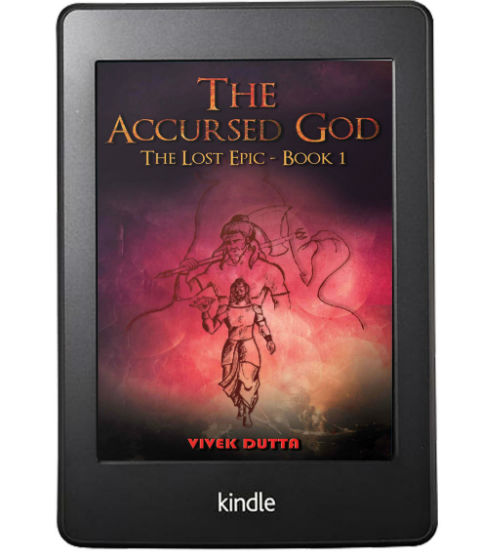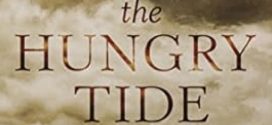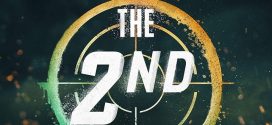It is rightly said that Mahabharat (aka Mahabharata) is the greatest epic known to mankind. Any kind of possible situation and relationship is found in it, in its simplest and complex most forms.
This Is Here In For You
Listen To The Podcast:
If you love to listen to the book review over reading, or if you want to go through it while doing other activity, here is our Podcast of this review article. Do listen, and share your thoughts with us.
Spotify:
YouTube:
It won’t be wrong to say that every writer who grew up with ancient Indian literature told to him in various forms, dream to write his/her own version of Mahabharat. For example, Late Harilal Upadhyay (a Gujarati author) have tried to stick to the original popular version of Mahabharat in his Mahabharat book series which is comprised of 7 books.
Most importantly in Bharatiya (that is Indian) culture, such retellings and reimaginings are welcomed wholeheartedly. Traditionally wise ancestors of Indians believed in conveying a message and let the learner interpret it as per situation and time he/she lives in, at the very moment.
Here are some other books based on Mahabharat we’ve got a chance to read recently and found them worth sharing with you all.
- Jaya : An Illustrated Retelling Of The Mahabharata | Book Review
- Corpokshetra: Mahabharata in the MBA Yug by Deepak Kaul| Book Review
- Barbarika by Hariharan Raju | Book Review
- Ashwatthama’s Redemption: The Rise of Dandak by Gunjan Porwal | Book Review
- BHIMSEN by Prem Panicker | Mahabharata As Bhim View It | Book Reviews
| Book Title | : | The Accursed God (The Lost Epic – Book 1<) |
| Author | : | Vivek Dutta |
| Publisher | : | Eduworld Publishers (16 January 2020) |
| # of Pages | : |
400 (Hardcover) 6333 KB; 392 (Kindle EBook) |
| # of Chapters | : | 41 |
| Purchase Link(s) | : |
Adding to the list is a fantastic book titled The Accursed God: The Lost Epic – Book I By Vivek Dutta. Vivek works in the software industry and that doesn’t stop him from writing book(s). As this book clearly says it is “Book I”, we can surely expect more books in the series.
Book Cover:
Of course, we shouldn’t consider the book cover as the only parameter to judge a book by. But, we came to see it as the first attribute of the book, and thus it is responsible for making the first impression of the book. A book cover can highly influence reading/purchase decision for sure.
Let us take a look at the cover page of this book.

The Accursed God: The Lost Epic – Book 1 By Vivek Dutta | Book Cover
The title of the book is quite challenging to come up with a cover design. The job is done by Shristi, a niece of the author, who is one of the early readers of the book (obviously). In fact, she has contributed some illustrations in the book as well.
The dark to red to yellow to black shded background shows illustrations of three prominent characters from Indian mythology. They are, Lord Shiva, Bhagwan Parshuram and Bhishma (aka Bheeshma). The gestures explored in this illustration are meaningful and you came to know their significance when you read the book. In fact, by the time you came to read “The Accursed God”, it is around more than 60% of the book you’ve completed reading! And then you will realize whom the book refers so.
The cover page is not very attractive but is loyal to the story. I will say, a moderately good book cover.
Book Plot:
The book covers incidents from Jaya (or JayaSamhita) even much far before since the well-known portion of the same “Mahabharat” starts depicting in most of the popular versions.
You come to know about, what lead to the great battle of Kurukshetra (popularly known as Mahabharat-war) through the mouth of one of the most prominent characters of this epic, who had seen many generations growing and dying in front of.
Bhishma, the grand regent of Hastinapur was on his death-bed, the bed of arrows, and Krishna paid him a visit. Krishna asked Bhishma to narrate the incidents where he was silent, and that is how he started telling it. Krishna kept visiting him for all the remaining days of the war, to hear the course of events from him.
It all starts with the tale of King Somark of Panchal. Jantu was his son. It would be worth to note that Jantu’s son was Prishat who in turn was the father of Drupad. King Somark created a conspiracy to defame Shantanu, the king of Hastinapur, who was the emperor of Aryavart at that time. He, in fact, created a group of the kings of all vassal states to rebel against the Emporer. It was the first significant incident when Bhishma (then Devbrata) had to come into action.
How he tackled the situation is nicely explored in the book.
It was followed by his meeting with Ved Vyas. Eventually, he convinced Dasraj to allow his daughter Satyavati to marry king Shantanu (Devbrata’s father)!
The book moves ahead and explores the incidents of how Chitrangad and Veer (Vichitraveer) born and grew up. Chitrangad’s killing is explored quite in detail.
The incidents that happened after that, led to Dhritrashta’s marriage with Gandhari and Pandu marrying Kunti and Madri.
This chain of incidents is explored in 41 chapters where we meet many of the well-known characters from Mahabharata. The list includes (but not limited to) Ved Vyas, Devbrata, Somark, Jantu, Prishat, Drupada, Singhverma, Chitrangad, Gorkhas, Yakshas, Gandharvas, Trishala, Subalja, Chatrashal, Shakti Swaroop, Drupad, Devki, Vasudev, Jarasandh, Ugrasen, Devak, Sini, Sursena, Sangini, Sridhwaj, Bhagwan Parshuram, and others…
I must say, this is one of the most interesting retellings and reimagining of Mahabharat I got a chance to read for sure. Of course, it has its positives and unfortunately letdowns too. Before we continue, let me share with you that we’ve got the ARC (Advance Review Copy – EBook Version) of this book and the author has confirmed that there might be some proofreading errors in this version. The review is personal, unbiased and uninfluenced by all means, as always.
The way the author has explored the characters and revealed their shades is interesting. I consider it as one of the most positive points of the book. Be it the character of Bhishma or even Jarasandh, the way the author explores them, is amazing. In most of the tellings and retellings, the death of Chitrangad, the eldest son of Satyavati, is referred to merely as “he met with his death when fighting with a yaksha king of the same name”. This book has a detailed narration (of course, fictional, but logical) of those incidents. In fact, the kingdom of Panchal also didn’t explore in so depth in most of the alternative popular versions.
Also, the author has decided to go rational and logical way rather than superficial, and thus, you see more of reasoning in his narration. That makes the book quite interesting. The book is actually a fictional conversation between Krishna and Bhishma, and I must say it is a fantastic one. The way both of them talk, share funny moments, share sadness and other emotions,… is amazing to read. especially the way Krishna convince Bhishma to share his tale of silence and reveal why the war of Mahabharat was not just a family feud ( why otherwise entire Aryavart would have joined it?).
Ha! No matter what we say today, someone will alter and distort it tomorrow. Then Pitamah, we need an alternative narrative – your narrative.
The same way the conversation between Parashuram and Sahastrarjun is amazing, it explores a lot about various mindsets and why they need to rectify.
The best indicator of a society’s success can be traced to its beggars. A society where people beg because they are denied sufficient opportunity to earn, or they beg because the government seeks pride in feeding them, is a big question mark on the social structure.
But we created a contrary doctrine – begging by the highest order of the society. We denied ourselves – the teachers, the scholars, the yogis, and the legislatures, from any personal possessions and resorted to begging. Begging, not because we are not capable of earning, not because we desist hard work, but, because begging gave us the humility and the selfless attitude needed to create the rule for the general good of the society. We, who are capable of earning everything, if we allow ourselves to rein free, we can amass power and wealth, and that would be an injustice to others.
I found the conversation about Vishnu’s Chakra and why it was taken from him, why he needed to pray to Lord Shiva to get it back, the consequences of Karma, the cosmic rules, the Vaishnavite/Shaivite conflict, the concept of Penance and why even God himself needs to attain it, is explored very amazingly.
The book contains some fantastic oneliners. Here are some of them:
But “forever” doesn’t last forever.
Strange is the way of humans.
Hope, many times, is a fooling beast. …
True, wisdom comes with age, and faster in the times of crisis.
Anything that is not perfect is essentially imperfect.
Prayer and weapons, both are for brave – a coward is suited for neither.
Krishna’s smiles were his weapons and sometimes shield.
A pack of super excited hyenas can’t protect you against a lion.
But, wandering far off, even on the right track, is no better than taking a wrong path.
What we want to believe is destiny; what we don’t want to is superstition. Isn’t it?
Here are some more interesting lines I found in the book:
Leaders are not elected Vasudev. Leadership is not given’ its’ always taken. Once you take the leadership people accept. That’s how it is.
Anyone who dares to protect is the Vishnu.
I am the disciple of Neelkantha Shiva. I am ready to swallow poison and lead a curse life.
Even the horses now knew the exact path that leads them to Dev Udayan.
You should be careful about what you wish for.
Wise people don’t kick the beehives.
If you need to live in peace, you need to destroy the beehive, … because you would not escape the stung even if someone else kicks it.Prince wasn’t sure whether to condemn his father’s ruthlessness or salute his love for his motherland …
Life isn’t black and white princess – it carries different colors and zillions of shades of them. Right and wrong, too, is colorful rather than just black and white.
Luxury is great thing – a rendezvous with flattery and luxury boost one’s confidence like nothing else, and the fear of losing them forever make men braver than they are.
Truth is not Dharma Pitamah. Unlike Dharma, the truth is not universal; it varies with people and milieu.
I was determined to write the destiny myself. And to think of it, it’s as easy as spawning a tale for a kid; if you know a little of shastras. The entire Aryavart listens like a dumb kid.
Look at Maheshwar, the destroyer. He destroys to protect. Think, isn’t it creation requires the destruction of current shape? Can the plants grow without destroying the upper crust of the earth? Can you create clothes without destroying trees? Can a creation survive without preservation? No Ram – Creation, Preservation, and Destruction are not three different elements; they are the essence of this universe – they are inseparable.
Each quote has its own perspective and meaning, and I would suggest you to explore your vision for the same. If you ask me to settle down with just one quote from the book, then I will quote the following phrase, which I found really amazing.
Might might win.
For any flight, take-off and landing are the two most essential stages. They show the skills of the pilot. The smoother these phases are the better “under-control” the aircraft is.
Unfortunately, the take-off for this book is quite confusing and clumsy. Especially, for the regular reader it will be challenging to understand what is happening. Of course, after reading a few chapters, you will find the things getting smoother. According to me, a list of the prime characters and their roles should have been listed in the beginning of the book, it would have been better reading experience.
It happens in India that based on the place the person grew up, the local linguistics affect his version of names and places. So I cannot complain that words like Devbrata or Aswamegh should have different spelling. However, there are words which must have bee written in the correct manner, as in most of the cases, it changes the meaning, for example: Dryutkrida, Yonjandandha, Udayan. Such things matter a lot, especially when your target readership is global.
Another disappointing thing I found in the book is the lack of uniformity when mentioning names/places. It is a different thing that you call him “Bhishm” or “Bhishma” or “Bheeshma” or “Bhisma”, but whatever word you use, should have to be the same throughout. Of course, there are exceptions to the rule like, if the people from different ethnicity is referring to the same person with a different version of his name, then it is fine. Here is a list of some names that it referred to differently (sometimes, even on the same page!).
- Vashu – Vasu
- Ambikabhatt – Ambika Bhatt
- Sahasrarjun – Sahastrarjun
- Bhisma – Bhishma
- Veda – Ved
- Somdutta – Somedutta
- Swayamber – Swayamver
- Dhritrastra – Dhritarashtra
- Devki – Devaki
- Kansha – Kansa
- Satrughna – Shatrughna
- Mathura – Matura
Here are some lines where you pick proofreading errors and wish they could have been edited better.
Aryavart runs after Veda’s and Dharma blindly son.
What once was a great and prosperous kingdom now, is now on the brink of being bankrupt.
That day there was a room full.
If he insists on duties of war – we will give him the war and force the duty on, him, and the whole of Hastinapur would pay for his inexperience.
You must protect from elements from destruction and other times you must destroy to protect.
Chatrashal reported Prishat, too, was adorable.
How foolish I was I thought my family will be my guarding angle.
Sadanandji himself prayed Vishwanthji to bestow his kindness…
The above-mentioned quotes must have given you a fair idea about the linguistics and quality of writing in the book. The reimagining by Vivek is interesting and he has the power to pen-down his imagination in a fantastic way. Personally I like the book a lot for its qualities. His reimagining remains faithful to the most popular narrative, and yet it brings freshess. The author is here to stay and deliver some fantastic mythology retellings for sure.
Summary:
If proofreading errors were not there and the starting was better, the book could have been a masterpiece. It is nonetheless a fantastic retelling of Mahabharat with freshness in narration, exploration of untouched, or rarely touched parts of the epic. A must-read for mythology lovers.
ThinkerViews Rating:
Around 7 to 7.5 out of 10.
Quick Purchase Links:
Over To You:
If you already have read the book do share your remarks and thoughts via comments below. Does this review help you in making your decision to buy or read the book? Do not forget to share this article with your friends over various social networks via Twitter, Facebook and others. And yes, you may like to subscribe to our RSS feeds and follow us on various Social networks to get latest updates for the site to land right in your mailbox.
 ThinkerViews – Views And Reviews Personal views and reviews for books, magazines, tv serials, movies, websites, technical stuff and more.
ThinkerViews – Views And Reviews Personal views and reviews for books, magazines, tv serials, movies, websites, technical stuff and more.



